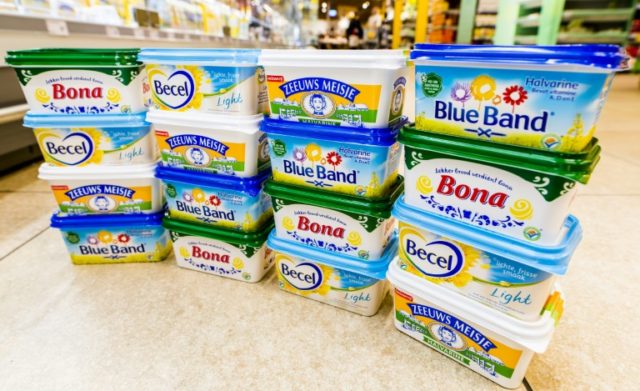The Hague (AFP) – Anglo-Dutch consumer giant Unilever Thursday announced a six billion euros ($7.4 billion) buy-back scheme ahead of the spin-off of its spreads division, as it braces for major company changes.
Sales however in the first quarter were down 5.2 percent to 12.6 billion euros, falling from 13.3 billion euros in the same period in 2017, it reported, citing a negative impact from currency exchanges.
Chief executive Pol Polman voiced confidence however ahead of the sale of its margarines division, and amid plans to drop London as one of its two bases.
“The first quarter demonstrates another good volume-driven performance across all three divisions,” Polman said in a statement, highlighting a 4.0 percent sales growth in emerging markets.
He revealed that a six billion euros buy-back programme would be launched in May “to return the expected after-tax proceeds from the spreads disposal. We are raising the dividend by 8.0 percent, reflecting confidence in our outlook.”
The company said in December that it had sealed a 6.8 billion euro deal to sell its spreads division to US private equity giant KKR, and Polman said the move was expected to be completed “in the middle of the year.”
Its magarines division includes such familiar names as Flora, Blue Band and Rama.
In another major shake-up, the company is also readying to end its dual-headed structure, abandoning its London headquarters in favour of Rotterdam.
The company was founded in 1930 after the Dutch margarine producer Margarien Unie merged with British soapmaker Lever Brothers.
It has over 400 brands in its portfolio, including household names like yeast extract Marmite, PG Tips tea and Persil washing powder, Knorr soup as well as Dove beauty products and Magnum ice-cream.
– Shareholder concerns –
Until now, it has maintained a dual-headed structure, with listings on the London, Amsterdam and New York stock exchanges.
But last month, the company announced it was choosing The Netherlands to host its headquarters, dealing a blow to Britain’s efforts to keep multinational companies onside following Brexit.
The move came in the wake of a failed hostile bid by US rival Kraft Heinz last year, which analysts said played a key role in Unilever’s decision as the Netherlands has stronger takeover protection rules.
Sources told the Financial Times the company has been holding meetings with British-based shareholders to convince them it is the right move.
But some top shareholders told the British financial daily they are “extremely worried” about the plans, which would likely see Unilever excluded from the FTSE 100.
Unilever employs some 169,000 people around the world, but the change in its structure will have no impact on its 7,300 employees in Britain and 3,100 in the Netherlands, the company said.
As it prepares to shed its spreads, Unilever revealed that sales without that division stood at 11.9 billion euros, also a 5.2 percent drop on the first quarter in 2017.
The first quarter results failed to impress markets, with shares dropping 2.33 percent to 45.14 euros a share by 0830 GMT on the Amsterdam AEX bourse.

COMMENTS
Please let us know if you're having issues with commenting.